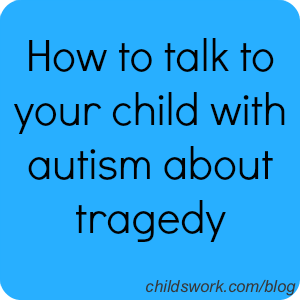
Helping your child with autism through tragedy
 If you have a child with autism who is aware of the tragedy in Connecticut here are some tips on talking about it with them and helping them cope:
If you have a child with autism who is aware of the tragedy in Connecticut here are some tips on talking about it with them and helping them cope:
1. Think about what you will say and how your child with hear it. Unfortunately, this is not the first time I have had to explain a tragic situation to my daughter. The last time I tried to sugar-coat my words and speak emotionally rather than factually, forgetting that this is not the way she thinks and processes. A week or so after our talk I realized she had taken some of what I said literally and by not speaking in her "language" I had caused her to misunderstand the situation.
2. Let them process. You may be discussing the events with your child and wondering if they are listening or processing what you are saying. Give them time to let the information sink in and do what they need to do to stay calm. While I was talking with my daughter she recited math problems and talked about her bus ride and I wondered if all my talking was in vain but she did hear me, it just took her several days to process the news.
3. Check on them often. After you have discussed a tragic situation with your child, check on them often, be available when they are ready to talk or have more questions and be prepared for behaviors that exhibit their stress. It is hard to know how or when they have processed what has happened but you need to be ready to offer support when they do.
4. Be prepared for questions that may be difficult to answer. Many of our children will have questions that may sound insensitive to some but are just the way they process what has happened. They may want to know about the event in terms of times and numbers and insist on discussing things in far more detail than your emotional state is prepared to do, but do the best you can to keep in mind that this is what they need from you right now.
5. If your child has Asperger's, prepare yourself for the inevitable. We have all heard the news media refer to the Connecticut shooter as a man with Asperger's. If you have a teen or young adult with Asperger's they may have some tough questions about who they are and why someone with their diagnosis would be in the news. If you don't feel you can adequately answer these questions or your answers do not satisfy your son or daughter, it may be time to consult a counselor or therapist for their assistance.
There is nothing easy about discussing tragedy with our children and helping them understand something we can't make sense of ourselves. The best thing you can do as a parent is to address the subject as soon as you feel your child is old enough or mature enough to understand and be ready and willing to help them cope with the stress of this unbelievable tragedy. Have you discussed the tragedy with your child? Is there anything that help your child understand or cope?
Leave a comment